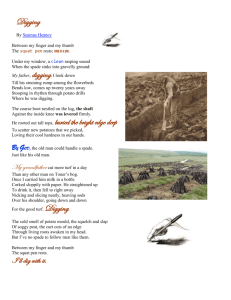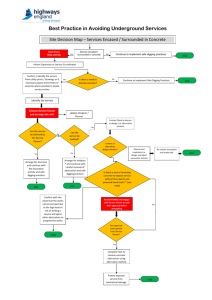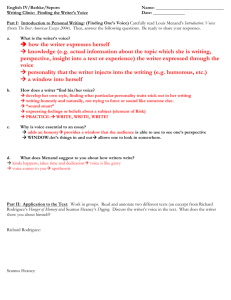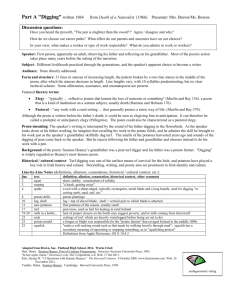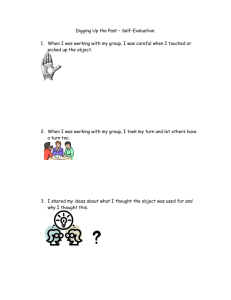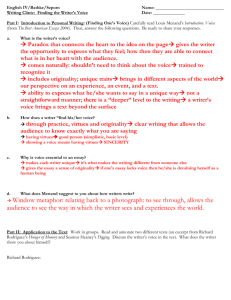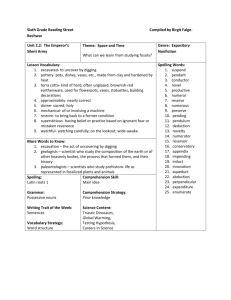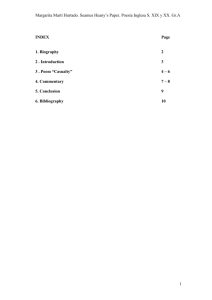File
advertisement
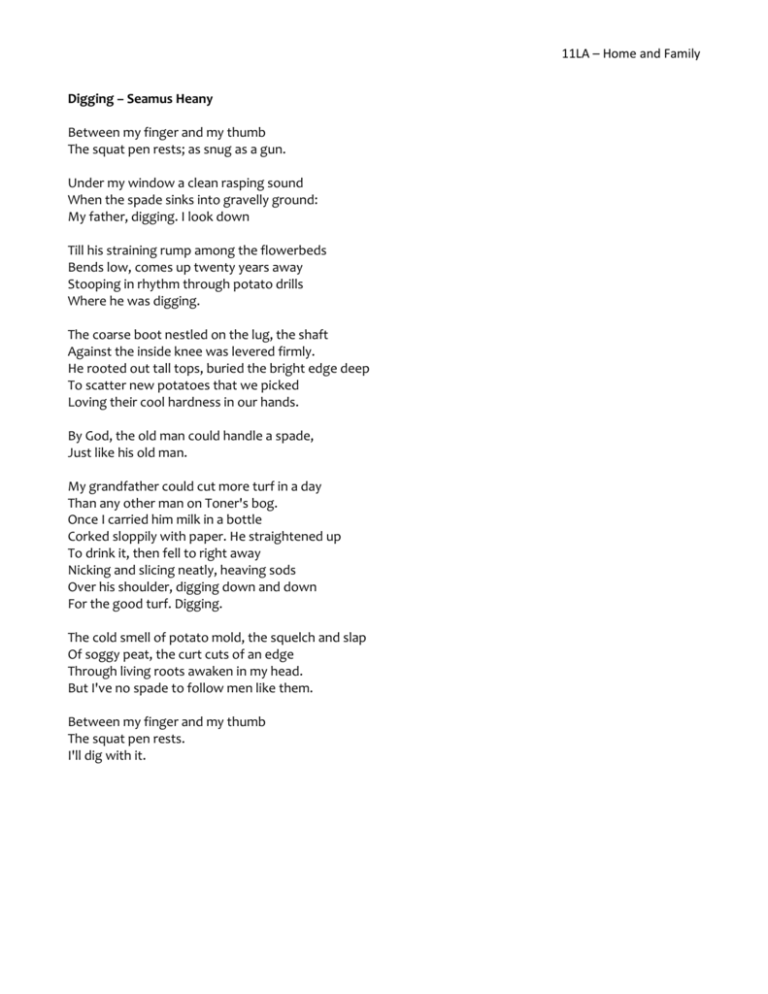
11LA – Home and Family Digging – Seamus Heany Between my finger and my thumb The squat pen rests; as snug as a gun. Under my window a clean rasping sound When the spade sinks into gravelly ground: My father, digging. I look down Till his straining rump among the flowerbeds Bends low, comes up twenty years away Stooping in rhythm through potato drills Where he was digging. The coarse boot nestled on the lug, the shaft Against the inside knee was levered firmly. He rooted out tall tops, buried the bright edge deep To scatter new potatoes that we picked Loving their cool hardness in our hands. By God, the old man could handle a spade, Just like his old man. My grandfather could cut more turf in a day Than any other man on Toner's bog. Once I carried him milk in a bottle Corked sloppily with paper. He straightened up To drink it, then fell to right away Nicking and slicing neatly, heaving sods Over his shoulder, digging down and down For the good turf. Digging. The cold smell of potato mold, the squelch and slap Of soggy peat, the curt cuts of an edge Through living roots awaken in my head. But I've no spade to follow men like them. Between my finger and my thumb The squat pen rests. I'll dig with it. 11LA – Home and Family Seamus Heany - From “Opened Ground” The cool that came off sheets just off the line Made me think that damp must still be in them But when I took my corners of the linen And pulled against her, first straight down the hem And then diagonally, then flapped and shook The fabric like a sail in a cross-wind, They made a dried-out undulating thwack. So we’d stretch and fold and end up hand to hand For a split second as if nothing had happened For nothing had that had not always happened Beforehand, day by day, just touch and go Coming close again by holding back In moves where I was x and she was o Inscribed in sheets she’d sewn from ripped-out flour sacks RESPOND: 1. In the first poem: what things do you know about the speaker? How is he different from the people he describes? 2. In the second poem: there are two people folding sheets together…but who do you think they are? What is their relationship to one another and how do you think they feel? What clues from the poem lead you to believe this? 3. What is the tone of each poem? How would you describe the way the speaker feels about the things he is describing? What parts of the text help you to recognize this? 4. In these poems, a literal action (folding sheets / digging) acts as an extended metaphor for our connections to home and family. a. What might “digging” represent to the speaker of the first poem? b. What might the “folding sheets” represent for the characters in the second poem? 11LA – Home and Family Extended Definitions - Writing Practice Part 2: Illustrating When we illustrate a concept in writing, we give examples, and narrate incidents that help to make our ideas clearer to our reader. We can show what a broad and abstract idea looks like in a very specific and concrete context. consider how this ILLUSTRATION uses details to help us imagine something. Also notice how it tells a very specific STORY. The two poems by Seamus Heany that we have just read are good examples of illustrations of “home” and “family” that help us as readers to better understand what these ideas mean and the significance they hold in the mind of the writer. 1. Heany illustrates through narration—also known quite simply as “storytelling”. He tries to put us right into a specific experience from his memory, telling us about the thoughts and feelings he had experienced during a particular moment in his past. 2. Heany’s illustrations are particularly effective because of his strong use of concrete imagery. Although we most often think of “images” as things we can see with our eyes, in writing a concrete image refers to any sensory description—words that encourage us to try to imagine a sight, smell, taste, sound, or touch. YOUR TURN: We are going to try to “steal” some ideas from Seamus Heany today. But instead of writing poetry as he has here, we are going to try to work the ideas of illustrating through narration and using concrete details into a section of our extended definition assignment. You’ve already been working on “classifying and comparing” your chosen term (home or family), so you should have an idea of the direction your extended definition might take. Next you have to consider a specific moment, situation, or example that helps you to illustrate the points you are trying to make. Once you have chosen an example, narrate the story to your readers—and use lots of concrete images to reinforce your idea.
